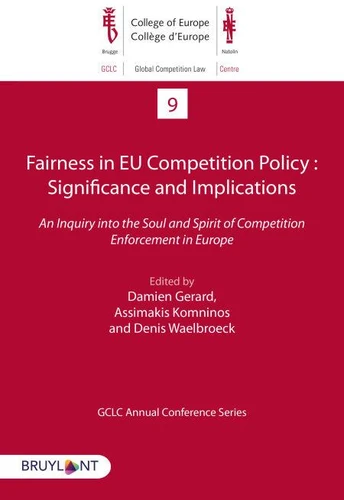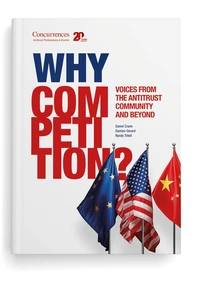Fairness in EU Competition Policy : Significance and Implications. An Inquiry into the Soul and Spirit of Competition Enforcement in Europe
Par : , ,Formats :
Disponible dans votre compte client Decitre ou Furet du Nord dès validation de votre commande. Le format ePub est :
- Compatible avec une lecture sur My Vivlio (smartphone, tablette, ordinateur)
- Compatible avec une lecture sur liseuses Vivlio
- Pour les liseuses autres que Vivlio, vous devez utiliser le logiciel Adobe Digital Edition. Non compatible avec la lecture sur les liseuses Kindle, Remarkable et Sony
 , qui est-ce ?
, qui est-ce ?Notre partenaire de plateforme de lecture numérique où vous retrouverez l'ensemble de vos ebooks gratuitement
Pour en savoir plus sur nos ebooks, consultez notre aide en ligne ici
- FormatePub
- ISBN978-2-8027-6718-3
- EAN9782802767183
- Date de parution03/06/2020
- Protection num.pas de protection
- Infos supplémentairesepub
- ÉditeurBruylant
Résumé
The idea of fairness has recently re-entered the policy discourse underpinning competition law enforcement, in the EU and beyond. Of course, the term "unfair" can be found in the EU Treaty and the avoidance of consumers' exploitation is the ultimate aim of competition principles. Still, the boundaries of fairness as a driver of competition enforcement appear unclear and, for some, dangerously flexible.
At the same time, whilst the application of competition rules has over the years been focusing on restrictions to the competitive process with the effect of harming consumers, a wave of cases recently brought or decided at EU and national level appear to be inspired by wide and somewhat elusive fairness considerations, including non-discrimination, neutrality, equality of opportunities, natural justice or avoidance of abuse of law.
Reference can be made to cases relating to product design, IP licensing, geo-blocking, network neutrality, privacy concerns or fiscal justice. This volume explores how fairness may guide competition enforcement, what its significance may be in explaining recent trends and actual outcomes, and what implications can be observed or expected by relying on a fairness standard in the design of substantive principles.
Associating lawyers and economists, practitioners and academics, it discusses the boundaries of fairness in a world where the rationality of markets has been profoundly shaken by recent crises.
At the same time, whilst the application of competition rules has over the years been focusing on restrictions to the competitive process with the effect of harming consumers, a wave of cases recently brought or decided at EU and national level appear to be inspired by wide and somewhat elusive fairness considerations, including non-discrimination, neutrality, equality of opportunities, natural justice or avoidance of abuse of law.
Reference can be made to cases relating to product design, IP licensing, geo-blocking, network neutrality, privacy concerns or fiscal justice. This volume explores how fairness may guide competition enforcement, what its significance may be in explaining recent trends and actual outcomes, and what implications can be observed or expected by relying on a fairness standard in the design of substantive principles.
Associating lawyers and economists, practitioners and academics, it discusses the boundaries of fairness in a world where the rationality of markets has been profoundly shaken by recent crises.
The idea of fairness has recently re-entered the policy discourse underpinning competition law enforcement, in the EU and beyond. Of course, the term "unfair" can be found in the EU Treaty and the avoidance of consumers' exploitation is the ultimate aim of competition principles. Still, the boundaries of fairness as a driver of competition enforcement appear unclear and, for some, dangerously flexible.
At the same time, whilst the application of competition rules has over the years been focusing on restrictions to the competitive process with the effect of harming consumers, a wave of cases recently brought or decided at EU and national level appear to be inspired by wide and somewhat elusive fairness considerations, including non-discrimination, neutrality, equality of opportunities, natural justice or avoidance of abuse of law.
Reference can be made to cases relating to product design, IP licensing, geo-blocking, network neutrality, privacy concerns or fiscal justice. This volume explores how fairness may guide competition enforcement, what its significance may be in explaining recent trends and actual outcomes, and what implications can be observed or expected by relying on a fairness standard in the design of substantive principles.
Associating lawyers and economists, practitioners and academics, it discusses the boundaries of fairness in a world where the rationality of markets has been profoundly shaken by recent crises.
At the same time, whilst the application of competition rules has over the years been focusing on restrictions to the competitive process with the effect of harming consumers, a wave of cases recently brought or decided at EU and national level appear to be inspired by wide and somewhat elusive fairness considerations, including non-discrimination, neutrality, equality of opportunities, natural justice or avoidance of abuse of law.
Reference can be made to cases relating to product design, IP licensing, geo-blocking, network neutrality, privacy concerns or fiscal justice. This volume explores how fairness may guide competition enforcement, what its significance may be in explaining recent trends and actual outcomes, and what implications can be observed or expected by relying on a fairness standard in the design of substantive principles.
Associating lawyers and economists, practitioners and academics, it discusses the boundaries of fairness in a world where the rationality of markets has been profoundly shaken by recent crises.









